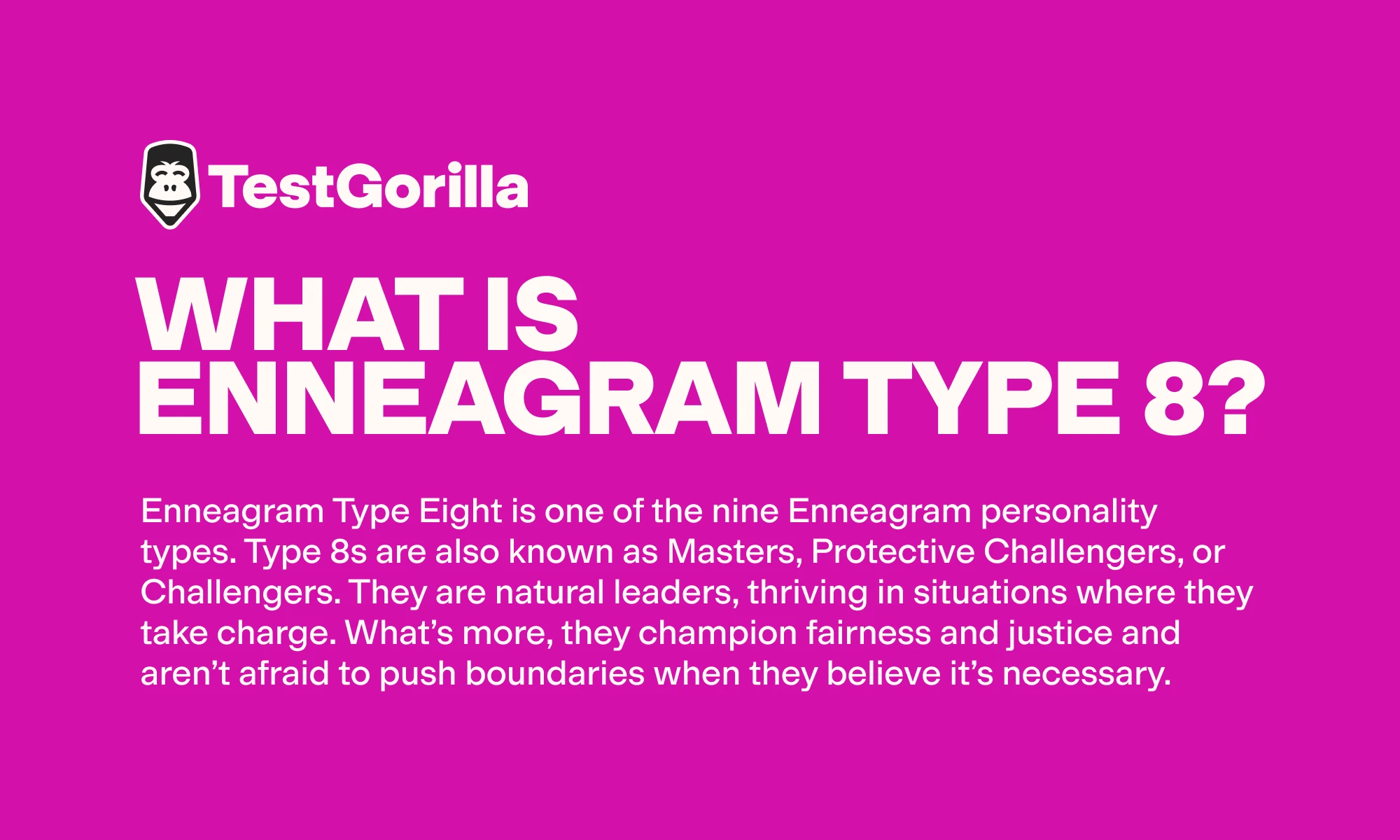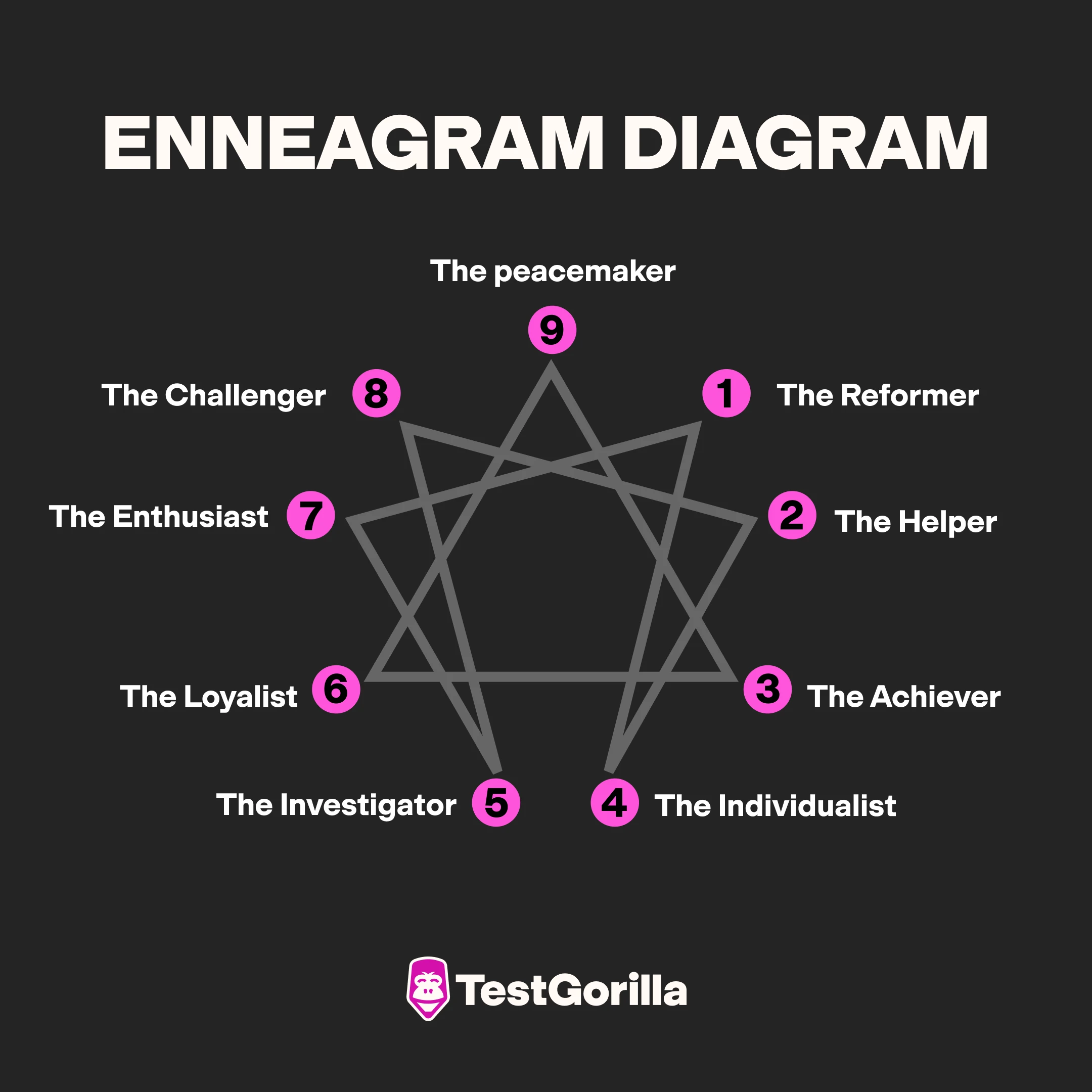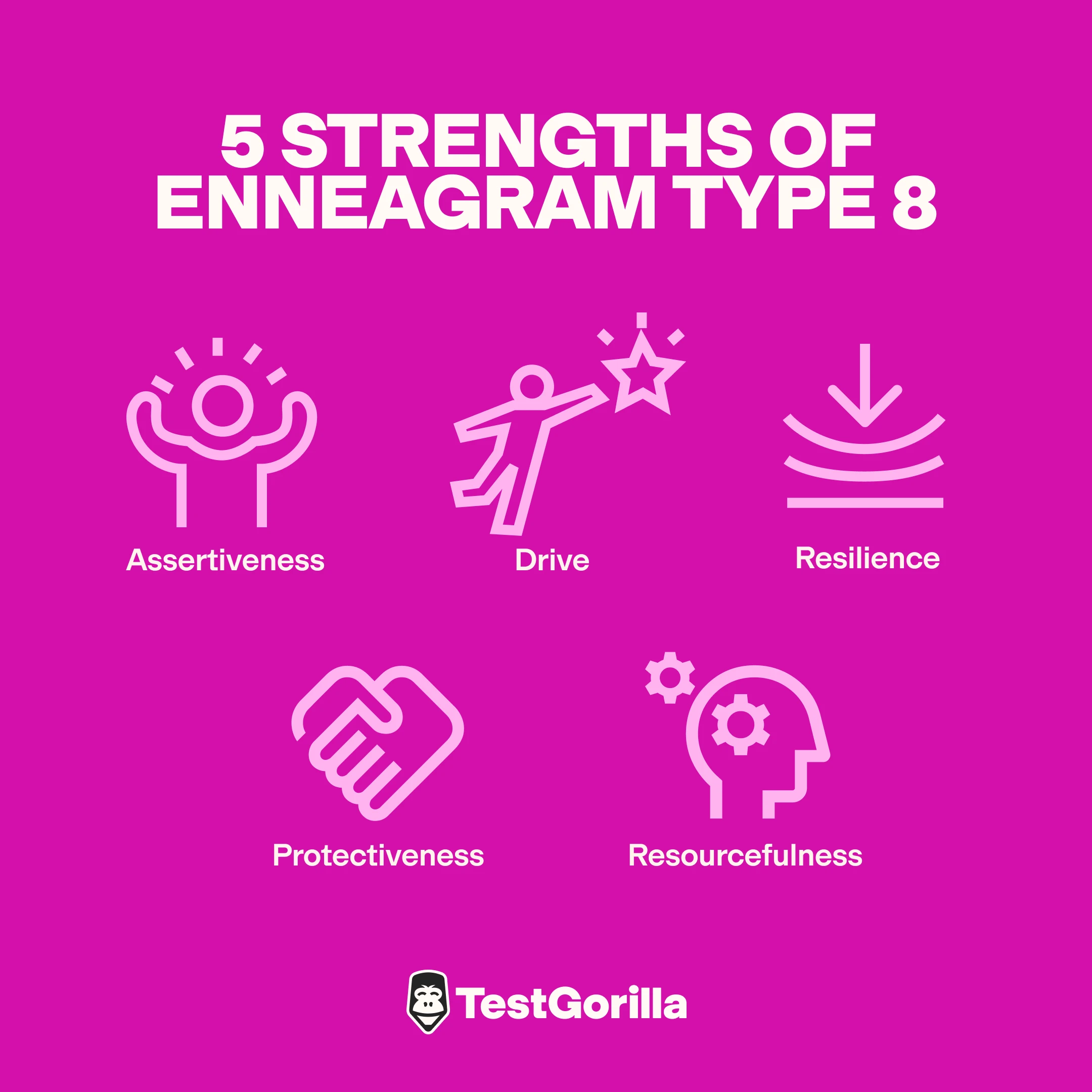Get to know your candidates better with TestGorilla's Enneagram test
Getting to know your applicants isn’t always easy when you’re on a tight hiring schedule. Thankfully, the Enneagram personality test helps you dig deep into what motivates them by splitting human behavior into nine distinct personality types.
One of these nine types, Enneagram Type Eight, is independent and self-assertive but sometimes has trouble following rules.
In this guide, we explore Type Eight’s strengths, weaknesses, working preferences, and career options and how to spot them through skills testing.
What is Enneagram Type 8? An overview
Enneagram Type Eight is one of the nine Enneagram personality types. Type 8s are also known as Masters, Protective Challengers, or Challengers. They are natural leaders, thriving in situations where they take charge.
What’s more, they champion fairness and justice and aren’t afraid to push boundaries when they believe it’s necessary.
Type Eights are:
Assertive: People with the Challenger personality type are confident in expressing themselves and their opinions
Natural leaders: Their assertiveness and ability to make quick decisions often lead them to take control
Bold: They’re self-reliant and unafraid to tackle challenges head-on
Independent: Type Eights value autonomy, dislike depending on others, and aren’t easily influenced by outside opinions
Justice-oriented and protective: They focus on equality, fairness, and justice and have a strong desire to protect others
Potentially intimidating: Their commanding presence, protective nature, and boldness sometimes intimidate or overpower others
Type 8 wings
Often, people don’t just fall into one Enneagram personality type. Each Enneagram type has two neighboring types known as “wings.”
On an Enneagram diagram, you can see wings on either side of each personality type. The wings for Type Eight are Type Seven, the Cheerleader, and Type Nine, the Agreeable.
Some Enneagram Eights lean more towards Type Seven traits, so their Enneagram type would be 8w7. This means that they show some characteristics associated with Type Seven.
Other Type Eight individuals are more influenced by Type Nine traits and thus would be an 8w9 type.
Let’s explore these subtypes.
Type 8w7
Type 8w7s blend the strong leadership of Type Eights and the energetic nature of Type Sevens. They’re usually more extroverted and social than other Masters.
Their powerful and excitable personalities often make 8w7s the life of the party. They’re ambitious and action-oriented but also have a zest for life that makes them engaging and likable.
Studies into Type Sevens and Eights suggest that the two are closely related, with both being extremely open and extroverted.
Type 8w9
Type 8w9s combine the assertive nature of Enneagram Eights with the peacemaker and principled qualities of Type Nines.
8w9s are usually calmer and more composed than other Type Eights, but they still take decisive action when needed. This balance often makes them influential leaders who promote harmony while ensuring that tasks get done.
They’re also protective but patient, making them well-liked and respected by others.
Discover your candidates’ strengths and motivations
Register for free with TestGorilla today and start exploring personality tests that help you understand your applicants better.
Enneagram 8s: 5 key strengths
In certain roles and situations, Type Eight individuals are inspiring and motivating. For example, when facing project challenges, assertive Eights push for innovative solutions, protecting and encouraging others to keep trying.
According to the Enneagram, they typically have five core strengths, which, like any other type, are balanced out with potential weaknesses.
Below, we break the key strengths down before exploring them in more detail.
Strength | Potential Weakness |
Assertiveness | Masters appear intimidating and cause conflicts |
Drive | Challengers rush into decisions and overlook others |
Resilience | Eights fear appearing vulnerable and struggle to admit fault |
Protectiveness | Masters sometimes become controlling and isolated from others |
Resourcefulness | Challengers’ self-sufficient personality sometimes prevents others from making decisions |
1. Assertiveness
Type Eight individuals are energetic and dominant and never fear having to make difficult decisions. As a result, they often help to inspire healthy productivity and drive results in challenging circumstances.
They view most things in black and white, which helps them be assertive in difficult decision-making. However, their tendencies to dominate sometimes make them seem confrontational, leading to team conflicts.
In addition, studies show that Challenger personalities are one of three Enneagram types that outwardly express frustration instead of internalizing it.
2. Drive
Enneagram Type Eights are full of ambition. They often want nothing more than to succeed and push back against restrictions and challenges. They’re also inspiring to work with on challenging projects.
However, this willingness to push back sometimes leads to clashes with authority figures and misplaced frustration. In addition, they’re prone to rushing into some decisions without taking others’ opinions into account.
Research also suggests Masters tend to be more open to new experiences than most, which supports their fearless reputations.
If you’re prioritizing this trait when hiring, the same studies suggest Type Threes, or Go-getters, are almost as open-minded as Eights.
3. Resilience
A core desire of Enneagram Eights is to be self-sufficient and resilient. As a result, Protective Challengers strive to be a positive influence or figurehead in their workplace, which makes it hard for them to give up on obstacles.
Type Eights also need to be understood and respected. Without this, they’re likely to push back and get frustrated. Some Eights also find it hard to admit fault because vulnerability is a basic fear of theirs, which at times leads to conflict.
4. Protectiveness
Type Eights have a strong sense of justice and stand up for anyone or anything they believe in.
At work, Type Eights with a healthy attitude and mindset support their hardest-working team members and look out for their wellbeing. Many Masters and Challengers protect less confident employees as well.
However, Enneagram Eights’ protectiveness and independence sometimes isolate them from their team, undermining their ability to build strong, collaborative relationships.
For example, Challengers value self-control and appearing strong, which leads them to push others away rather than letting co-workers in or asking for help.
5. Resourcefulness
Type Eights are always ready to go the extra mile to solve problems. Their high self-confidence and drive help them seek opportunities that others might feel too awkward or uncomfortable approaching.
On the reverse, some Masters genuinely believe they’re the only people who are able to handle some tasks.
This reluctance to let others apply knowledge and skills sometimes slows progress on tasks, leaving coworkers feeling shut out.
The best insights on HR and recruitment, delivered to your inbox.
Biweekly updates. No spam. Unsubscribe any time.
Suitable career trajectories for the Enneagram Type Eights
Type Eights are drawn to careers that enable them to exercise their leadership skills and sense of justice. They often excel in the following roles:
Role | Relevant Strengths |
Lawyer | Assertiveness Resilience Protectiveness |
Business owner | Resourcefulness Drive |
Politician | Assertiveness Drive Resilience |
Marketing strategist | Resourcefulness Drive Assertiveness |
Sales director | Assertiveness Drive Resourcefulness |
Financial advisor | Protectiveness Resourcefulness Assertiveness |
That said, the Enneagram shouldn’t be your sole resource for finding candidates for the positions above. As useful as the Enneagram is, it’s unprofessional and irresponsible to rely on it alone to find technically talented and well-rounded hires.
With TestGorilla’s Free forever plan, recruiters and hiring managers test candidates on technical knowledge, role-specific abilities, soft skills, and personality traits – making it easier for you to allocate the best people to roles such as those listed above.
Many companies lean toward tests like the Enneagram to better understand their candidates’ personalities before interviewing. Moreover, studies suggest that Enneagram testing is helping to improve engagement and communication strategies.
Enneagram Type 8 in the workplace
In the workplace, you’re likely to see Type Eights leaning toward leadership roles, mainly because they prefer to take charge and implement their ideas rather than take a back seat.
Some Type Eights make great leaders. They advocate for fairness, stand up for themselves and their team, and are happy to make tough decisions when necessary.
In addition, keep in mind that Eights thrive on autonomy. They dislike being controlled or micromanaged and appreciate workplaces that value their opinions and respect their independence.
Type Eights’ intense and protective nature also often translates to a powerful drive to maintain a safe, just work environment for their team.
How can employers support Type 8s at work?
Nurturing Type Eights helps you develop a proactive, dynamic, and innovative workplace. Here are a few tips to get you started:
Be honest and open: Support Enneagram Type Eights in the workplace by being upfront, direct, and respectful. They respond well to open communication.
Help them see different points of view: Encourage Type Eights to share their ideas, but challenge them to consider others’ perspectives. Doing so ensures they feel valued while also promoting a more inclusive environment.
Don’t micromanage: Look for and provide Type Eights with opportunities to lead and make decisions to make them feel trusted and respected, boosting their engagement and performance.
Be mindful of their fear of vulnerability: Offer feedback constructively, with care and respect. Challenge their actions when needed, but be open to hearing their side of the story.
Show them it’s ok to ask for help: Help Masters see the value of vulnerability and show them that needing support doesn’t equate to weakness. Encourage them to express their feelings and needs to foster stronger team relationships.
Self-development advice for Enneagram Type 8s
The Enneagram test isn’t just useful for HR teams and coaches. Research states that Enneagram typing helps people develop self-awareness and learn how to approach challenges more effectively.
There are several ways for Masters to foster personal growth and improve their performance and relationships at work. They could:
Work on becoming more receptive to others: This requires active listening and a genuine willingness to value others’ contributions. Eights might focus on keeping eye contact, avoid interrupting, and show they’re listening by repeating what they’ve heard.
Express their feelings more openly: Although this challenges the Master’s core fear of vulnerability, it helps them build more meaningful, trusting relationships with their co-workers. A great way to do this is to get to know colleagues better, so they feel more comfortable, even if it means basic small talk at first.
Start stepping back and giving others control: Doing so supports a more collaborative team environment and helps Challengers learn from others’ strengths and perspectives. Journaling and evaluating where and how they could step back helps Eights to see where to change their behavior.
Learn the value of vulnerability: Type Eights build trust with their team and strengthen their relationships by seeing vulnerability as a genuine need, not a weakness. They should learn to ask for help and lean on team members when needed.
Find a talented Type Eight for your team
Interested in hiring dynamic, proactive Type Eights? Use TestGorilla’s in-depth Enneagram test and talent discovery platform to find driven, ambitious, well-rounded candidates.
Determine your candidates’ Enneagram type with TestGorilla
It’s not easy to spot a Protective Challenger at face value. However, what is easy is running TestGorilla’s Enneagram Personality test as part of your hiring process.
Our ten-minute test asks applicants to answer customizable questions that dig deep into their motivations and how they see themselves.
For example, you might ask a candidate a multiple-choice question about how they handle difficult situations:
In this preview question, a Type Eight would say they are determined in times of hardship – and their answer would add toward an overall score for that Enneagram type.
Similarly, with the question below, a Master candidate would likely say they speak their mind rather than be withdrawn:
These are just two preview questions from the Enneagram test that help you identify Type Eight applicants – we encourage you to explore more and try our platform for free.
At the end of the test, your candidates’ scores are recorded directly to your TestGorilla account, helping you to see which applicants are which types at a glance.
This is useful when, for example, you’re hiring at volume and want to align certain personality types with specific roles. For Type Eights, for instance, you might allocate them to leadership positions.
That said, hiring candidates on their personality scores alone doesn’t give you insight into technical ability and soft skills. We recommend using multi-measure talent assessments, where you also test applicants on hard and soft skills and culture add.
You can measure applicants on up to five different tests at once with our talent discovery platform:
This way, you’re sure that you’re hiring well-rounded people who:
Are technically proficient in specific roles
Add to your workplace culture
Have desirable personality traits and soft skills
Running assessments that include personality tests helps you avoid costly mis-hires – just take IDP Education as an example.
The consultancy, a leader in global education services, introduced skills-based recruitment through TestGorilla to help improve the quality of people it hired.
By adopting personality tests and letting applicants show off their skills, the company cut down time-to-hire and made more confident, sustainable hiring decisions.
According to Lara Mendoza, the company’s Country Marketing Manager, they saved “months that would’ve been spent on training the wrong person.”
If you’re keen to boost hire quality and cut down hours spent recruiting unsuitable applicants, check our recruitment ROI calculator for some personalized insight.
Join for free and find meticulous Masters
Need help finding assertive, dedicated people for your workforce? Sign up for free with TestGorilla and start exploring our personality tests today.
Hire a dependable Enneagram Type 8 with TestGorilla
Enneagram Type Eights are strong-willed, independent, and protective. They have a natural talent for taking charge and inspiring others, making them exceptional leaders.
Using TestGorilla’s Enneagram test as part of your hiring process helps you find Type Eight candidates so you’re able to allocate them to roles where they’re likely to thrive.
What’s more, you might use the test results to learn more about what makes them tick and to prepare for future coaching opportunities.
If you’d like to see how TestGorilla’s talent discovery platform helps to transform hiring processes for the better, book a free demo with us today.
When you’re ready to explore on your own, sign up for a free 15-day trial (if you have more than 50 full-time employees).
You've scrolled this far
Why not try TestGorilla for free, and see what happens when you put skills first.
























